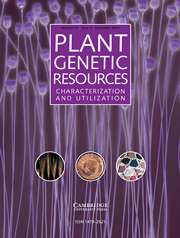Article contents
Identification of yield contributing traits and genotypes to drought tolerance in finger millet (Eleusine coracana L. Gaertn.)
Published online by Cambridge University Press: 01 March 2023
Abstract
Screening of germplasm for specific traits is a continuous pre-breeding process in deriving the drought-tolerant donors required for crop improvement. The study evaluated 17 medium-late duration finger millet genotypes under drought stress (DS) for 28 days during the reproductive stage to identify the traits and genotypes for drought tolerance using different statistical analysis. The photosynthetic rate (by 26.3%), stomatal conductance (by 26.4%), transpiration rate (by 24.8%) and grain yield (by 13.2%) were decreased and found sensitive to DS, but the leaf temperature was increased (4.7%). From the path analysis and multiple linear regression analysis, the mean ear weight and productive tillers were found to contribute to the grain yield significantly under well-watered conditions. While under DS conditions, the mean ear weight, productive tillers and threshing percentage equally contributed to grain yield. Based on the ranking of traits significantly contributing to grain yield, the genotype GE-4683 with a higher mean ear weight (10.65 g) was found superior to the popular variety, GPU-28. The Multiple linear regression equation predicts the possibility to increase the yield of GPU-28 under DS from the existing 360.0 to 459.5 g per square metre (by 29.1%) by the incorporation of three productive tillers instead of the existing two tillers per plant in the MLR equation. An additional 1.0 g of mean ear weight will be able to predict an increased grain yield from 360.0 to 392.0 gm−2, equivalent to 3.60 to 3.92 t/ha (by 9.4%).
- Type
- Research Article
- Information
- Copyright
- Copyright © The Author(s), 2023. Published by Cambridge University Press on behalf of NIAB
References
- 2
- Cited by


